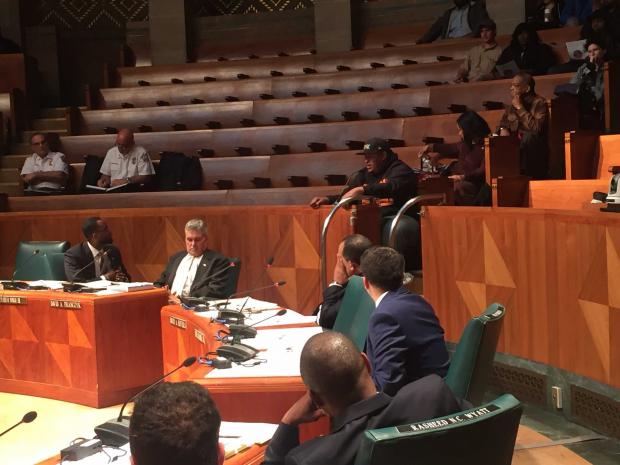The Quiet War Over Buffalo's Budget
Common Council budget hearings are usually a staid affair that don’t garner much attention from the public, but last Thursday’s hearing was something of an exception with close to 50 people showing up and nearly half that number offering comments to the body.
The many critics of the budget focused on the the city’s apparent misplaced priorities. Funding for police, for example, has steadily increased, while funding for education and community resources have remained the same. Literature distributed by the Clean Air Coalition pointed out that in the past 10 years, while the city’s budget has grown 18 percent, its funding of the police department has risen 32 percent even though the number of 911 calls has remained relatively flat. The Buffalo Police Department is slated to take a $133 million slice out of the city’s total $500 million dollar pie.
“Since 2007 we’ve seen 477 homicides of which only 270 have been solved, despite an increase in ‘man power,’ the rate of which Buffalo solves homicides has declined yearly,” the Clean Air Coalition claims. “By its own numbers, the BPD has shown itself unable to do the job they say they are here to do, to ‘protect and serve.’ Meanwhile residents go without services that will address their needs like mental health, drug addiction, youth, senior, differently- abled, and veteran services. Studies have shown that when a municipality increases funding to services that provide for its residents’ needs crime, in general, decreases.”
Or put a different way by Buffalo School Board Member Paulette Wood who spoke to advocate for a greater contribution from the city: “It’s easier to build strong children, than repair broken men.” During Byron Brown’s tenure as mayor, funding to the schools has been a flat $70.3 million annual, but facing pressure, he allocated a $500,000 raise. Wood, along with Buffalo Parent Teacher Organization members Larry Scott and Eve Shippens, asked the Common Council to raise that figure to a cool million.
The feel-good story of the evening became Participatory Budgeting, an effort to put financial decision into a community’s hands directly. One speaker thanked PB for park benches at the Dewey Avenue playground, another for new garbage receptacles in Hamlin Park, and several councilmen made full-throated endorsements of PB, including David Rivera, who has pledged $10,000 of his annual discretionary funds to the internationally practiced program.
The loser, in most of the speakers minds, was the Buffalo Police Department. Speaker after speaker decried the department’s zero tolerance program, and John Washington referred to policing in Buffalo as a “crisis.” Many speakers brought up the use of checkpoints throughout the city, but predominantly in African American neighborhoods.
Fruit Belt resident India Walton told the council that the “checkpoints have been proven not to reduce crime but they penalize poor people for being poor. I have gotten tickets for such minor things as dirty license plates.”
At the end of the hearing, Council President told the assembly he would look into the checkpoints, and ask the BPD for basic information. Speaking to The Public a few days after the hearing, Pridgen said he wants to learn from the BPD the exact location of checkpoints in the past year, as well as the rationale behind the use of checkpoints. Once he has that information, he pledges to make it public.
But the Ellicott District councilman cautioned that some favor the checkpoints.
“There’s a two headed monster here, there are some neighborhoods that ask for them,” Pridgen said. “I’ve heard from block clubs who want speed control, some neighbors want more enforcement.”
Graph created by the Clean Air Coaltion
That hearing culminated in a budget meeting this Thursday in City Hall which grew contentious after a group of twenty or so activists mainly from Just Resisting pressured the Common Council to take action with regards to the Buffalo Police. During the hourlong meeting, Councilman Wingo addressed his concern about stop-and-frisk type arrests and asked BPD officials for numbers on those arrests, which police officials said they didn’t have, and Councilman Pridgen further requested information on checkpoints. Police said the rationale for checkpoints comes from identified hotspots according to crime statistics they monitor.
But not satisfied with the council’s polite jabs in the direction of the police, the activists demanded that the council reject the $500,000 raise for the BPD.
“Folks are here today because we want the council to not approve the $500,000 increase to the police budget until Officer Tedesco and Officer Acquino are fired,” Natasha Soto firmly stated to a raucous applause, referencing the recent police shooting of an unarmed man in Black Rock.
North District Coucilman Joe Golombek, in whose district the shooting occurred and who organized an impromptu rally in support of Officer Acquino on Sunday night when it was believed he had been shot, interjected, “So the victim, gets…” Golombek started, in apparent reference to the group request that an officer wounded in the line of duty should face a negative consequence.
But he couldn’t finish his thought. “The victim is dead!” the group shouted back.
“You guys are ridiculous,” Golombek, the only councilman not in attendance during last week’s hearing, went on. “You don’t know what you’re talking about with this budget,” he said, going to on to scold the group for their lack of information, saying people have been calling his office complaining about the city buying new rifles for the BPD. “You’re acting like this is Berkeley or UB!” he said.
Last week Lovejoy Councilman Fontana explained that the “much less lethal” rifles being procured by the BPD were being paid for by outside grant money.

